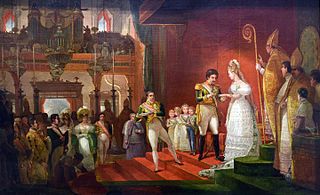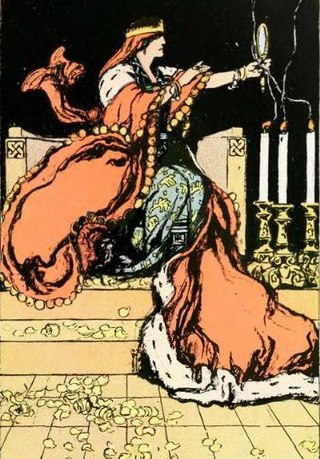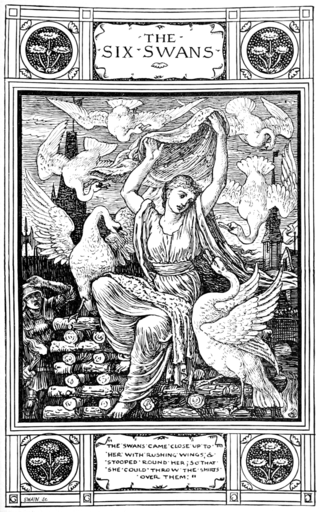
"Cinderella", or "The Little Glass Slipper", is a folk tale with thousands of variants that are told throughout the world. The protagonist is a young girl living in forsaken circumstances who is suddenly blessed by remarkable fortune, with her ascension to the throne via marriage. The story of Rhodopis, recounted by the Greek geographer Strabo sometime between 7 BC and AD 23, about a Greek slave girl who marries the king of Egypt, is usually considered to be the earliest known variant of the Cinderella story.

"Snow White" is a German fairy tale, first written down in the early 19th century. The Brothers Grimm published it in 1812 in the first edition of their collection Grimms' Fairy Tales, numbered as Tale 53. The original German title was Sneewittchen; the modern spelling is Schneewittchen. The Grimms completed their final revision of the story in 1854, which can be found in the 1857 version of Grimms' Fairy Tales.

A stepmother, stepmum or stepmom is a female non-biological parent married to one's preexisting parent. Children from her spouse's previous unions are known as her stepchildren. A stepmother-in-law is a stepmother of one's spouse.

"Hansel and Gretel" is a German fairy tale collected by the Brothers Grimm and published in 1812 as part of Grimms' Fairy Tales. It is also known as Little Step Brother and Little Step Sister.

The Evil Queen, also called the Wicked Queen or just the Queen, is a fictional character and the main antagonist of "Snow White", a German fairy tale recorded by the Brothers Grimm; similar stories exist worldwide. Other versions of the Queen appear in subsequent adaptations and continuations of the fairy tale, including novels and films. A particularly notable version is Disney's depiction, sometimes known as Queen Grimhilde. The character has also become an archetype that inspired unrelated works.
Robert Moran is an American composer of operas and ballets as well as numerous orchestral, vocal, chamber and dance works.

The Juniper Tree is a 1990 Icelandic medieval fantasy drama film written and directed by Nietzchka Keene. Based on the Brothers Grimm fairy tale "The Juniper Tree", the film was shot in black-and-white in a small budget in 1986. It stars Björk Guðmundsdóttir, Bryndis Petra Bragadóttir, Guðrún Gísladóttir, Valdimar Örn Flygenring and Geirlaug Sunna Þormar.
The Juniper Tree may refer to:

"The Six Swans" is a German fairy tale collected by the Brothers Grimm in Grimm's Fairy Tales in 1812. It is of Aarne–Thompson type 451, commonly found throughout Europe. Other tales of this type include The Seven Ravens, The Twelve Wild Ducks, Udea and her Seven Brothers, The Wild Swans, and The Twelve Brothers. Andrew Lang included a variant of the tale in The Yellow Fairy Book.

"The Juniper Tree" is a German fairy tale published in Low German by the Brothers Grimm in Grimm's Fairy Tales in 1812. The story contains themes of child abuse, murder, cannibalism and biblical symbolism and is one of the Brothers Grimm's darker and more mature fairy tales.
The Rose-Tree is an English fairy tale collected by Joseph Jacobs in English Fairy Tales.
Jayne West is an American operatic soprano, who was born in White Plains, New York on April 24, 1955, and was raised in Framingham, Massachusetts. After graduating with a Bachelor of Music in Vocal Performance and Masters in Music Teaching from Oberlin College, she moved to Boston, where she received her Masters in Music, magna cum laude from the Boston Conservatory.
"The True Bride" or "The True Sweetheart" is a German fairy tale collected by the Brothers Grimm in Grimm's Fairy Tales as tale 186.

In fairy tales, a donor is a character who tests the hero and provides magical assistance to the hero upon their success.

The given name Juniper is either in reference to the English common name for the juniper tree or berry, or in reference to a derivation of the Welsh name Guinevere. Juniper has historically been used as both a boys' name and a girls' name.
Stella Zambalis is an American spinto soprano born in Cleveland, Ohio. She has been called one of the best sopranos in the world today.
Transformations is a chamber opera in two acts by the American composer Conrad Susa with a libretto of ten poems by Anne Sexton from her 1971 book Transformations, a collection of confessional poetry based on stories by the Brothers Grimm. Commissioned by Minnesota Opera, the work, which is described by its composer as "An Entertainment in 2 Acts", had its world premiere on 5 May 1973 at the Cedar Village Theater in Minneapolis, Minnesota. Anne Sexton, who had worked closely with Susa on the libretto, was in the audience. It went on to become one of the most frequently performed operas by an American composer with its chamber opera format of eight singers and an instrumental ensemble of eight musicians making it particularly popular with smaller opera companies and conservatories. The 2006 revival production of Transformations at the Wexford Opera Festival won The Irish Times Theatre Award for Best Opera Production.
Ilana Davidson is an American operatic soprano who has had an active international career in opera and concert. She has sung on several recordings, including as a soloist on a recording of William Bolcom's Songs of Innocence and of Experience with Leonard Slatkin and the University of Michigan chorus and orchestra which won four Grammy Awards including Best Classical Album in 2006. She is the co-artistic director of the Chamber music series ClassicalCafe.
The Fall of the House of Usher is a 1988 opera by Philip Glass to a libretto based on Edgar Allan Poe's 1839 short story by Arthur Yorinks who also worked with Glass on The Juniper Tree.
Juniper Tree is a Canadian drama film, directed by Micheline Lanctôt and released in 2003. Based in part on the Brothers Grimm's fairy tale The Juniper Tree, the film stars Sylvie Drapeau as Esther, a depressed woman interacting with police officer Laurier after failing in an attempt to kill herself and her children.










